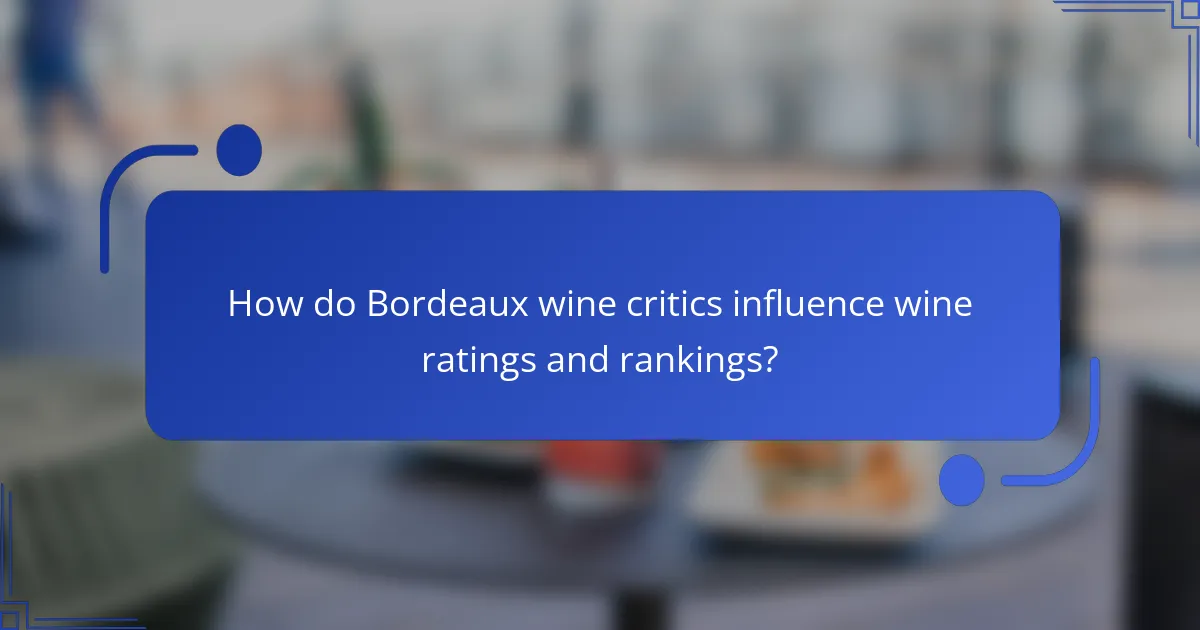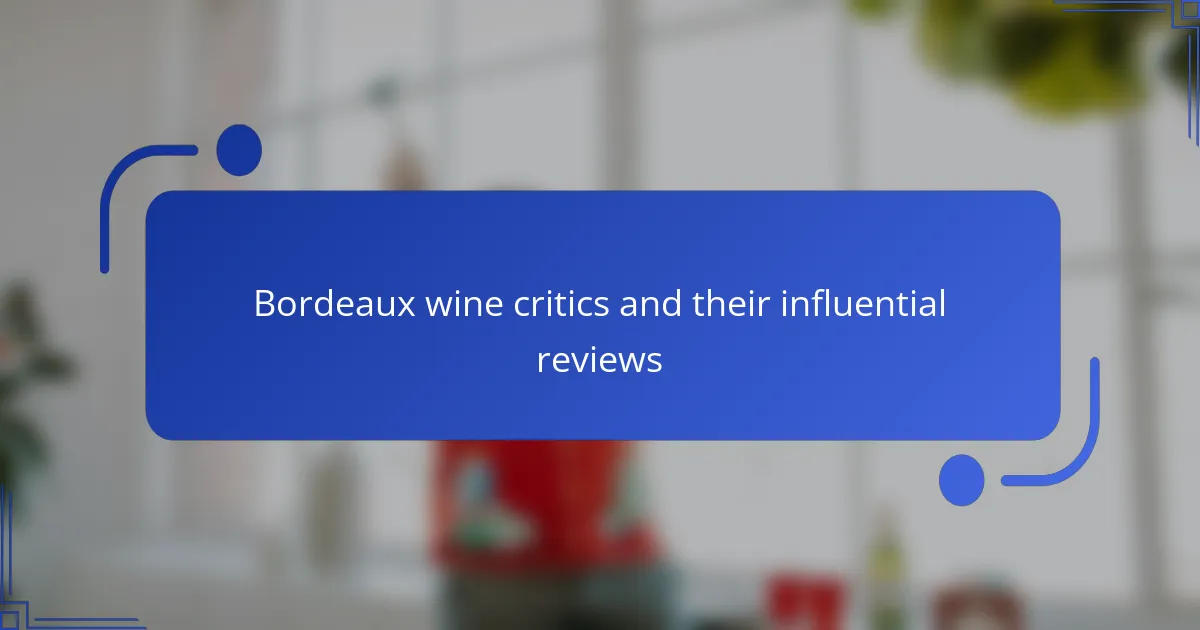
What are Bordeaux wine critics and their role in the wine industry?
Bordeaux wine critics are experts who evaluate and review wines from the Bordeaux region. Their assessments influence consumer choices and market prices. They provide ratings that can significantly impact a wine’s reputation. Notable critics include Robert Parker and Jancis Robinson. Their reviews often guide collectors and investors in purchasing decisions. The Bordeaux wine market relies heavily on these evaluations for establishing quality standards. Critics assess factors like aroma, taste, and aging potential. Their influence extends to wine producers, encouraging them to improve quality for better ratings.
How do Bordeaux wine critics evaluate wines?
Bordeaux wine critics evaluate wines using a systematic approach. They assess attributes such as aroma, flavor, body, and finish. Critics often use a scoring system to quantify their evaluations. Commonly, scores range from 1 to 100 points. Additionally, they consider the wine’s age and potential for aging. The context of the vintage and terroir also plays a significant role. Critics may conduct blind tastings to minimize bias. Notable critics, like Robert Parker, have established influential scoring systems that shape market perceptions. Their evaluations help consumers make informed purchasing decisions.
What criteria do critics use in their assessments?
Critics use several criteria in their assessments of Bordeaux wines. These criteria include appearance, aroma, flavor, and finish. Appearance refers to the wine’s color and clarity. Aroma involves the scents detected when the wine is swirled and sniffed. Flavor encompasses the taste profile, including sweetness, acidity, and tannin levels. Finish describes the aftertaste and how long the flavors linger. Critics often evaluate the balance and complexity of these attributes. The use of a 100-point scoring system is common among critics to quantify their assessments. This scoring system allows for a standardized comparison of wines.
How do personal preferences influence critics’ reviews?
Personal preferences significantly influence critics’ reviews by shaping their perceptions and evaluations. Critics often have individual tastes that affect their judgment of wine quality. For instance, a critic who favors bold, tannic wines may rate a Bordeaux with those characteristics higher. Conversely, a critic who prefers lighter, fruitier wines may give lower scores to the same Bordeaux. This subjectivity can lead to varying reviews of the same wine among different critics. Research shows that critics’ reviews can reflect their personal preferences, leading to inconsistencies in ratings. A study by the University of California revealed that critics’ backgrounds and experiences play a crucial role in their wine assessments.
Why are Bordeaux wine critics considered influential?
Bordeaux wine critics are considered influential due to their ability to shape market perceptions and consumer preferences. Their reviews often determine the pricing and demand for specific wines. Critics like Robert Parker have historically set benchmarks for quality through their scoring systems. High ratings from these critics can lead to increased sales and investment in vineyards. The Bordeaux region’s reputation is significantly impacted by their assessments. Additionally, critics provide detailed tasting notes that educate consumers. This information helps buyers make informed decisions. Their influence extends beyond Bordeaux, affecting global wine markets.
What impact do their reviews have on wine sales?
Bordeaux wine critics’ reviews significantly impact wine sales. Positive reviews can lead to increased demand and higher prices. For example, wines receiving high scores from critics often sell out quickly. A study by the University of California found that a one-point increase in a wine’s score can raise its price by up to 20%. Consumers often rely on critics’ ratings to make purchasing decisions. This reliance creates a direct correlation between reviews and sales performance. Critics’ influence shapes market trends and consumer preferences in the Bordeaux wine industry.
How do critics shape public perception of Bordeaux wines?
Critics shape public perception of Bordeaux wines through their reviews and ratings. Their evaluations influence consumer choices and market trends. High scores from reputable critics often lead to increased demand and higher prices. For example, a 100-point rating from Robert Parker can significantly boost a wine’s visibility. Critics also provide context by highlighting the wine’s unique attributes and production methods. This information helps consumers understand the quality and value of Bordeaux wines. Additionally, critics’ tasting notes can create narratives that resonate with wine enthusiasts. Overall, critics play a crucial role in defining Bordeaux wines’ reputation in the market.

Who are the most notable Bordeaux wine critics?
The most notable Bordeaux wine critics include Robert Parker, Jancis Robinson, and Michel Bettane. Robert Parker is renowned for his 100-point rating system. His reviews have significantly influenced wine prices and consumer preferences. Jancis Robinson is a respected wine journalist and author. She provides in-depth and insightful analyses of Bordeaux wines. Michel Bettane is known for his expertise and detailed tasting notes. His contributions have shaped the understanding of Bordeaux wine quality. These critics are pivotal in the wine industry, guiding both consumers and producers.
What are the backgrounds of leading Bordeaux wine critics?
Leading Bordeaux wine critics often have extensive backgrounds in wine education, tasting experience, and industry knowledge. Many have formal training in viticulture or oenology. Some critics, like Robert Parker, began their careers as wine enthusiasts before establishing their reputations. Others may have worked in wine sales or production, giving them practical insights. Many critics write for established publications or maintain influential blogs. Their reviews often shape market trends and consumer preferences. This influence stems from their deep understanding of Bordeaux’s terroir and vintage characteristics.
How did their careers in wine criticism begin?
Many Bordeaux wine critics began their careers through formal education in viticulture or oenology. They often started as sommeliers or in wine retail, gaining practical experience. This foundation allowed them to develop a deep understanding of wine. Over time, some transitioned to writing about wine, sharing their insights and reviews. Networking within the wine industry also played a crucial role in their career beginnings. Many critics attended wine tastings and events, connecting with producers and other professionals. Their initial reviews often appeared in local publications or online platforms. As their reputations grew, they contributed to larger publications, solidifying their status in the field.
What unique perspectives do these critics bring to their reviews?
Bordeaux wine critics bring unique perspectives shaped by their expertise and personal experiences. Their backgrounds often include extensive wine education and tasting experience. Critics may have specialized knowledge in regions, vintages, or varietals. This expertise allows them to identify subtleties that casual drinkers might overlook. Additionally, their tasting notes often reflect personal preferences and biases. These individual interpretations can influence how a wine is perceived in the market. Critics also consider broader industry trends and historical context in their reviews. This contextual awareness adds depth to their assessments of Bordeaux wines.
What are the distinguishing features of their reviews?
Bordeaux wine critics’ reviews are characterized by detailed sensory analysis and expert evaluations. They often include tasting notes that describe aroma, flavor, and texture. Critics assess the wine’s balance, acidity, and finish. Reviews frequently reference specific vintages and terroirs, providing context for the ratings. Many critics utilize a numerical scoring system to quantify their assessments. They also compare wines to historical benchmarks or similar varietals. The reviews are published in reputable wine publications or platforms, enhancing their credibility. Overall, the reviews serve as influential guides for consumers and collectors in the wine market.
How do different critics’ styles vary in wine evaluation?
Different critics’ styles vary in wine evaluation through their unique approaches to tasting and scoring. Some critics emphasize technical aspects, such as acidity and tannin structure. Others focus on subjective experiences, including aroma and flavor profiles. For instance, Robert Parker is known for his 100-point scale, prioritizing boldness and richness in wines. In contrast, Jancis Robinson often highlights elegance and balance, using a more nuanced descriptive language. Additionally, some critics may incorporate historical context or regional characteristics into their assessments. This diversity in style influences consumer perceptions and purchasing decisions in the wine market.
What common themes emerge in their reviews of Bordeaux wines?
Common themes in reviews of Bordeaux wines include complexity, balance, and aging potential. Critics often highlight the intricate flavor profiles that Bordeaux wines exhibit. Many reviews emphasize the balance between acidity, tannins, and fruitiness. Aging potential is frequently noted, with many wines improving over time. Additionally, terroir plays a significant role in reviews, affecting flavor and character. Reviews often mention the historical significance of specific vintages. The influence of winemaking techniques is also a recurring theme. Lastly, critics frequently discuss the value proposition of Bordeaux wines compared to other regions.

How do Bordeaux wine critics influence wine ratings and rankings?
Bordeaux wine critics significantly influence wine ratings and rankings through their assessments and reviews. Their evaluations can elevate a wine’s status, impacting market demand and pricing. Critics often publish scores that serve as benchmarks for consumers and producers. High ratings can lead to increased sales and prestige for wineries. Conversely, low scores can diminish a wine’s reputation and sales potential. The 1855 Bordeaux Classification established a framework that many critics reference. This classification still affects how wines are perceived today. Critics like Robert Parker have historically shaped consumer preferences and industry standards. Their influence is evident in auction prices and collector interest.
What methodologies do critics use for wine ratings?
Critics use several methodologies for wine ratings. Common approaches include blind tastings, where wines are evaluated without knowing their identities. This method reduces bias and focuses on the sensory experience. Critics often use a scoring system, typically ranging from 50 to 100 points. The 100-point scale is widely recognized in the industry.
Factors assessed during ratings include aroma, flavor, body, and finish. Critics may also consider the wine’s age and potential for improvement. Some critics use tasting notes to provide detailed descriptions of their impressions. The methodology may vary among critics, but consistency in evaluation criteria is crucial for reliability.
Many established critics have their own unique systems, adding to the diversity of methodologies. For example, Robert Parker’s Wine Advocate employs a specific point scale and detailed tasting notes. This approach has significantly influenced wine appreciation and purchasing decisions globally.
How do point systems affect the perception of Bordeaux wines?
Point systems significantly influence the perception of Bordeaux wines. These systems provide a quantifiable metric that consumers and collectors use to evaluate wine quality. A higher point score often correlates with increased desirability and market value. For instance, wines rated above 90 points are typically perceived as exceptional. This rating can lead to heightened demand and higher prices in auctions and retail. Critics like Robert Parker popularized this scoring method, impacting consumer choices. Research indicates that point scores can shape purchasing decisions, with many buyers relying on these ratings for guidance. Thus, point systems play a crucial role in shaping the market dynamics of Bordeaux wines.
What factors contribute to a wine receiving a high rating?
Factors contributing to a wine receiving a high rating include quality of grapes, winemaking techniques, and aging potential. The grape variety impacts flavor and complexity. Winemaking techniques like fermentation and blending influence the wine’s character. Aging potential indicates how well the wine will develop over time. Critics often assess balance, acidity, and tannins in their evaluations. The region’s terroir can enhance the wine’s uniqueness. Notably, Bordeaux wines often receive high ratings due to their historical significance and consistent quality. These factors are consistently highlighted in reviews by prominent wine critics.
What are the implications of critics’ rankings on wineries?
Critics’ rankings significantly impact wineries by influencing consumer perception and market demand. High rankings can enhance a winery’s reputation and increase sales. Wineries often invest in marketing strategies to leverage positive reviews. Conversely, low rankings may lead to reduced interest and sales. The Bordeaux wine market is particularly affected by critics due to its competitive nature. Research indicates that 80% of consumers rely on expert reviews when purchasing wine. This reliance underscores the importance of rankings in shaping winery success.
How do wineries respond to critic reviews and ratings?
Wineries often respond to critic reviews and ratings by engaging with the feedback provided. They may publicly acknowledge positive reviews through social media or press releases. This helps to promote their wines and enhance their reputation. For negative reviews, wineries might address concerns directly with the critic or adjust their production methods. Some wineries choose to improve their marketing strategies based on feedback. They may also invite critics for tastings to showcase improvements. In Bordeaux, the influence of critic reviews is significant, impacting sales and perception. Wineries recognize that constructive criticism can lead to better quality products.
What strategies do wineries implement to improve their ratings?
Wineries implement various strategies to improve their ratings. They focus on enhancing wine quality through careful selection of grapes and meticulous production processes. Investing in modern winemaking technology is also common. Many wineries engage in marketing efforts to promote their wines effectively. They often host tastings and events to increase visibility and attract critics. Collaborating with renowned winemakers can elevate a winery’s reputation. Additionally, wineries pay attention to feedback from critics and consumers to refine their offerings. Research shows that wineries that adapt to market trends tend to receive higher ratings.
What are the best practices for engaging with Bordeaux wine critics?
To effectively engage with Bordeaux wine critics, wine producers should prioritize transparency and authenticity. Providing detailed information about the wine’s origin, production methods, and tasting notes fosters trust. Inviting critics to vineyard tours enhances their understanding of the wine’s context. Personal interactions, such as tastings or events, create memorable experiences. Timely communication about new releases keeps critics informed. Respecting their expertise and feedback can lead to constructive relationships. Many Bordeaux critics value originality and uniqueness in wines, so showcasing distinctive qualities is beneficial. Engaging with critics through social media can also broaden reach and foster dialogue.
How can wineries effectively communicate with critics?
Wineries can effectively communicate with critics by providing transparent information about their production processes. Clear details regarding grape sourcing, fermentation methods, and aging practices help establish credibility. Engaging in direct dialogue during tastings allows for personal interaction. This fosters relationships and encourages constructive feedback. Sending samples of new releases to critics can also facilitate reviews. Additionally, responding thoughtfully to reviews shows respect for critics’ opinions. Inviting critics to winery events can enhance understanding of the brand’s philosophy. These strategies create a positive environment for ongoing communication and collaboration.
What tips can wine enthusiasts follow to interpret critic reviews?
Wine enthusiasts can enhance their understanding of critic reviews by focusing on specific aspects. First, they should familiarize themselves with the critic’s tasting notes and terminology. This helps in understanding the flavor profiles described. Next, enthusiasts should consider the critic’s scoring system. Knowing how scores correlate to quality can provide insight into the wine’s potential.
Additionally, it’s beneficial to compare multiple reviews from different critics. This offers a broader perspective on the wine’s reception. Enthusiasts should also pay attention to the vintage and region mentioned in reviews. These factors significantly influence a wine’s character.
Lastly, understanding the critic’s background and expertise can help gauge their perspective. Critics with extensive experience in Bordeaux wines may provide more nuanced insights. Following these tips can aid wine enthusiasts in interpreting reviews more effectively.
Bordeaux wine critics are experts who evaluate and review wines from the Bordeaux region, significantly influencing consumer decisions and market prices through their assessments. This article explores their evaluation methodologies, criteria for assessments, and the impact of personal preferences on reviews. It highlights the influence of notable critics like Robert Parker and Jancis Robinson on public perception and wine sales, as well as the strategies wineries employ to improve ratings. Additionally, the article discusses best practices for engaging with critics and tips for wine enthusiasts to interpret reviews effectively.
